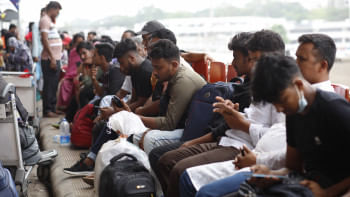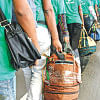What are the factors leading to labour migration from Bangladesh?

Md Fahimuzzaman was waiting at the departure area of Hazrat Shahjalal International Airport in Dhaka on Monday afternoon for a flight to Saudi Arabia where he landed a job at a car workshop.
The 26-year-old man from Rangpur's Gangachara upazila, who worked as a mason for more than a decade, said he chose to go work in Saudi Arabia due to a lack of earnings here.
"I used to get about Tk 18,000 a month from masonry whereas I can earn Tk 35,000 from the job in Saudi Arabia," he said.
A father of one, Fahimuzzaman said that his income in Bangladesh did not allow him to build any savings, expressing hope that better income in Saudi Arabia will change his fortunes.
The International Organisation for Migration (IOM) in 2020 published a report that explores, among other issues of labour migration from Bangladesh, the factors that guide migrant decision-making.
Conducted on 11,415 potential migrants who intended to move out of Bangladesh, the study titled "Bangladesh: Survey on Drivers of Migration and Migrants' Profile" found the majority (73 percent) chose to migrate to find better jobs and livelihood opportunities.
Shakirul Islam, chairperson of Ovibashi Karmi Unnayan Program, said, "Considering the IOM survey, there hasn't been much change in Bangladesh since people still migrate abroad after failing to secure decent income at home."
"The main thing is there are not enough job opportunities here as there should be. So, I think lack of employment opportunities is the main driver behind people's migration abroad from Bangladesh," he said.
While issues like unemployment and climate change induced challenges compel people, underemployment is also a major reason, if not a compulsion, in Bangladesh that drives people to go abroad, he added.
Amid this situation, Bangladesh is observing National Expatriates' Day and the International Migrants Day today.
In 2000, the UN General Assembly proclaimed December 18 International Migrants Day, taking into account the large and increasing number of migrants in the world, according to the UN website.
On the other hand, the Awami League government last year initiated observing the National Expatriates' Day on December 30 to recognise the contribution of expatriates, diaspora, and migrants.
This year, the interim government has decided to observe both occasions on December 18, according to a cabinet division circular, in line with the government's austerity measures.
Since 1976, nearly 17 million people have gone abroad for employment from Bangladesh, shows Bureau of Manpower, Employment and Training data.
According to the UN website, in 2006 a High-level Dialogue on International Migration and Development, the General Assembly stressed that international migration could contribute to development but recognised that international migration was not a "substitute for development".
All too often, migrants were compelled to seek employment abroad because of poverty, conflict or violations of human rights, it said.
Peace and security, good governance, the rule of law and the provision of decent work in countries of origin ensured that people migrated out of choice instead of necessity.
International migration needed to be an integral part of the development agenda and should be part of national development strategies, it added.
Shakirul Islam of OKUP said in the context of Bangladesh, it is essential to identify what are the factors and challenges that compel people to migrate and take steps to turn migration into a choice instead of compulsion.
In this regard, creating enough employment opportunities at home is a must, he added.

 For all latest news, follow The Daily Star's Google News channel.
For all latest news, follow The Daily Star's Google News channel. 






Comments